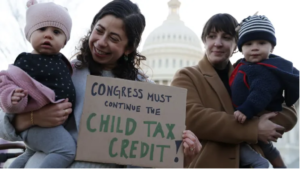
A part time waitress who drives Uber during the day. A banker who sells art on the weekend. A mom who tutors math on Tuesday nights. What do all of these people have in common?
They are all gig workers. And each one of them knits together a patchwork quilt of jobs unique to their skills, schedules, and needs in order to make ends meet.
For years gig work has been on the rise, but this year’s soaring increase during COVID-19, Europe’s recent regulations, and California’s regulatory fiasco, has made many policymakers wonder if the federal government should reclassify gig workers as employees.
Source: Contemporary Readings in Law and Social Justice This diagram shows the increase in only app based gig work. Today, ¼ adults take part in gig work that is both app based and not.
I have sympathy for the argument that gig workers need more security in their work, and reclassification seems like a silver bullet solution. If we make gig workers “employees” instead of “contractors” then they would get unemployment benefits, minimum wage, and health insurance.
Sounds great, right?
But we should always be weary of easy fixes to complicated issues. In this case, reclassification means less jobs and hours because of higher selectivity and less flexibility because of the rigid nature of 9 to 5 employment. That is not a pro-worker outcome.
Let’s be clear, we aren’t just talking about Uber drivers, although they are the gig economy poster child. About 1 in 4 U.S. workers engage in some kind of gig work and 58% of them report doing gig work part time. This includes tutors, shoppers, drivers, house cleaners, construction workers, artists, florists, and many more. Gig work is a huge and diverse industry.
Part of gig work’s popularity comes from flexibility. Workers can do almost any type of work as gig work, when they want, and for whom they want. For instance, 56% work for multiple employers or have two or more jobs. While some would prefer traditional employment, the vast majority, 79%, of gig workers said that they prefer gig work.
Reclassification would erase the flexibility that makes gig work appealing to many people. Currently, gig workers are legally classified as contractors because they work irregular hours, for more than one company, and provide their own equipment or work space. For many, flexibility is more important than traditional employee benefits. For instance, two out of three Uber drivers said they would stop working if their flexibility was compromised.
Unfortunately, gig workers would likely not even get the chance to decide to stop working because reclassification would make gig jobs more rare. Analysis shows that in California, reclassification of Uber would cause rides to drop 23-59% because ride prices would have to increase 25-111%. That means a 79% decrease in drivers (from 209,000 to 51,000 people). Essentially, we would be hurting the majority of the group in order to raise up a few.
What’s the alternative to reclassification as employees? We could create a new classification of “independent worker” with its own set of labor laws that are more malleable and do not pigeon hole gig workers. Or, we could expand gig worker’s positions as independent contractors to make sure they can set their own rates based on how they want to be compensated for their time.
Another innovative solution is a gig worker benefits fund. Workers would pay into a joint fund regardless of their gig company or if they switch between companies. They could use the fund for benefits they chose. That would eliminate the biggest problem with reclassification which is that we don’t know what benefits every gig worker wants or needs. For instance, employee benefits packages focus on health insurance, but many gig workers say that health insurance is not a priority. Most already have health care through another job or a family member.
At the end of the day, government policy should embody something the gig economy does best: flexibility. We should be giving gig workers options, not taking options away. If a worker wants to be an employee, let’s invest in retraining programs. They can drive Uber while they take accounting classes. But, if they want to be a gig worker, let them be gig workers.
We shouldn’t assume the traditional 9 to 5 cubicle grind is everyone’s ideal or that it meets every worker’s needs. Gig working can be a scary idea for policymakers because it deviates from the New Deal era conception of work that an employee should be tethered to one employer for all of their benefits. But maybe that idea of work is good for some and not all, and we should move past it. Maybe not every worker needs to be an employee.
Instead of saying that the work thousands of Americans have chosen is not good enough, policy should support gig workers in knitting together stronger patchwork quilts of work that most comfortably suits their situations. In that way, gig work can be part of a more diverse, dynamic, and inclusive labor force.



